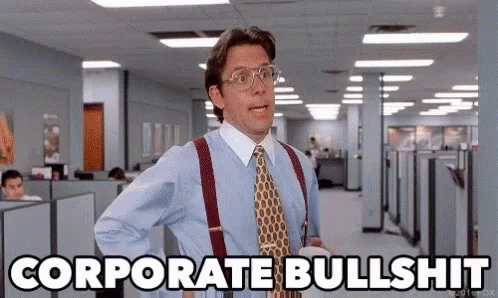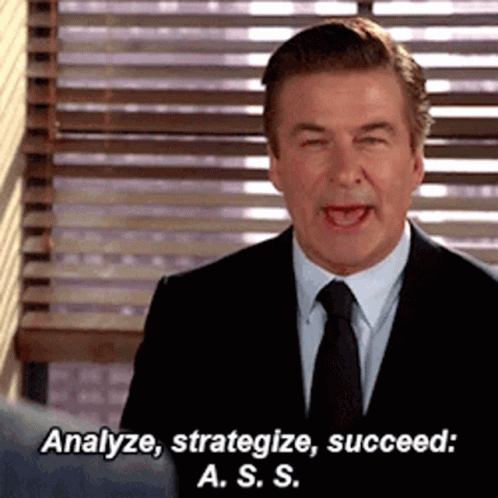The 7 Habits of Highly Toxic Companies
From propaganda machines to insincere trust, recognize the subtle yet insidious habits that perpetuate toxic workplace cultures, and learn how to protect your career and sanity.
My mission is simple.
I want more people to love what they do—and get paid well doing it.
Odds are, you’d like to love what you do, too.
We need to create environments that help one another feel truly happy and safe to accomplish this. We cannot feed or allow toxic behavior to fester.
Sometimes we may not recognize how toxic an environment is until we’ve had time to reflect. I’ve repeatedly found the following 7 toxic habits in scenarios with clients (and lived a handful myself).
I've been guilty of perpetuating this behavior—and maybe you have as well. Nobody is perfect.
This article identifies toxic behavior, so we can rally against it—or argue until the cows come home. The aim is to be satirical and critical—and earn a chuckle or two.
‼️
A quick note: This article uses satire, hyperbole, and occasionally strong language to highlight problematic workplace behaviors.
While based on real observations, many statements are intentionally exaggerated to make a point.
No specific company or individual is being directly targeted, and I recognize that many organizations are working earnestly to build healthy cultures.
My goal is to spark honest conversations about workplace toxicity so we can collectively do better.
If you bury your head, plug your ears, sit idly by, and cash another paycheck, hoping to avoid being the next target of yet another glaring red flag, you fall into passive acceptance and become complicit in the act.
But hey, I don't blame or judge you.
Let's recognize toxic companies and leadership, draw attention to what's not okay—and take charge of raising the bar for the sake of humanity.
Now onto the 7 toxic habits we all know—and often perpetuate.
No. 1: Propaganda Machines
I wonder why many of my clients that churn the corporate cog at one of the "Top 100 Best Places to Work" express feelings of disgust and misery. Aren't you working at a best place?
Perhaps the company is anything but one of the best, despite (the pay-to-play) public opinion.
Chances are, those Glassdoor reviews are nothing more than an HR initiative to promote positive reviews when times are good. Once the results are posted, they make sure the message sticks by using oodles of VC cash to beat the drum of your conscience into submission.
But upon further examination and a strong hesitancy to glug the Kool-aid, you may discover that the rosy facade is propped with PR-infused corporate defecation.
No one cares about ping pong tables, bean bags, and gift baskets when the culture sucks (unless of course the pay is good—but let's be honest, that's not likely).
The propaganda machines that serve to cover up toxic culture need to be examined.
Your Prescription:
Question everything.
Recognize that propaganda drumming is designed to deceive you and create a cult-like admiration. Finding the signal through the noise is a real hassle.
Consider that the more money and shiny objects they toss your way, the more they encourage you to turn a blind eye—or participate willingly in the chanting and melodic drum circle.
Double down on your due diligence and back-channel employees from several different backgrounds and seniority. You'll find most people are happy to provide honest feedback.
Dig deep to know whether you’re ready to gamble your sanity before joining a “Top 100 Best Places to Work” company—or any other company for that matter.
No. 2: "Humble" Leadership
In my experience, if someone has to tell you that they are humble, honest, or inclusive, there is a high likelihood that they're not what they purport to be.
A friend of mine shared that their CEO held a company all-hands meeting to address negative feedback he’d gotten about being sexist and demeaning women in the office (often publicly).
For over a half-hour, the CEO dribbled on to the company about how he couldn’t be sexist because he hired a pregnant woman. That’s like white people saying they can’t be racist because they have a black friend.
Projections are often telling in leadership.
Sometimes toxic leaders will even go as far as selling their deep-rooted flaws to you as an error in judgment on your part.
Talk about gaslighting.
True karma isn't about publicizing your good deeds. It's about helping others without seeking recognition or praise—doing the right thing simply because it's right, not for the story you'll tell later.
Your Prescription:
Question everything.
Oftentimes, the most troubling elephant in the room is the elephant being addressed directly. Just because it’s addressed doesn’t mean it’s gone or it's going to get any better.
Ask how leadership shares bad news or mistakes with the rest of the company. Do they genuinely believe that their team has the emotional intelligence to deal with the rough stuff? Or do they manipulate and soften information to feign control over issues they don’t want to confront? Tough decisions will always need to be made. True leadership is defined in these moments.
No. 3: Insincere Trust
It’s popular to talk about giving everyone a voice. A seat at the table, if you will. These companies talk about how they will hire really great people and simply get out of the way.
Fat chance.
The trap: often, toxic companies hire experts and don't listen to them—and then double down on a high-priced consultant to say the same thing, while the experts are left questioning their value and lamenting their future.
Toxic companies love to talk about welcoming team-wide discourse and may even ask to be challenged directly. But only if it's from their loudest employees. They mandate weekly check-ins and shallow team happy hours. Then pry and pry for feedback, but never want the truth.
Should the conversation ever steer too close to home, they’re quick to shut down differences of opinion and steamroll toward unilateral consensus. But, remember, they "trust" you—they just don't want your opinion—or don't want to act on it.
Your Prescription:
Question everything.
Ask tough open-ended questions such as, “Tell me about the last time you were publicly challenged. How did you handle the pressure?” Or try, “Can you share a time when your team was successful without your involvement?”
Breaking down a guarded executive will often take 3-5 repetitions of asking them “why” to earn clarity.
Consider that everyone wears their Sunday best during the interview process—and even the most diligent investigators can find unforeseen micromanagement when tensions rise later on.
No. 4: People First
Stop kidding yourself. Toxic companies build for the investor—not the user and not the employee, despite their claims.
Toxic companies choose profits over people every time.
Ask any expectant mother that’s been terminated a few weeks before maternity leave or that executive that got fired just after announcing they had cancer (of which I know more than a few).
The number of executives I've worked with who have completed a circus-routine hiring process for months—only to get dead silence in return from "employee first" companies—will make your head spin. Guess it's better than getting the ol' bait-and-switch later on.
And what about users? Or the nasty term markets call them, “consumers”?
Nom nom.
Do you think it’s healthy to build:
A product that chemically triggers endless screen time and scrolling?
A product that tanks self-esteem and increases suicide rates amongst teens?
A product that scoops massive swaths of single family homes and prices out a majority of our country?
A product laden with immense amounts of sugar, food dyes, and cheaper but frequently banned addictive substances?
A product reliant on near slave labor conditions from people that look different than us—but are really far away?
Are these companies people first then—or only when it doesn't intervene with profits?
Or are they deliberately engineering addiction for profit, then showering lobbyists with cash to shield themselves from government scrutiny?
I'm not donning a tinfoil hat just yet—but let's be real: some conspiracies eventually prove true. Nobody's bats 1000. Often, the only difference between being labeled a conspiracy theorist and a whistleblower is about six months and a breaking news story.
Your Prescription:
Question everything.
Don’t fall victim to fluffy rhetoric. Instead, follow the prescribed track of (1) Open-ended questions. (2) Why? (3) Why? (4) Why? (5) Assess and decompress.
For example, tell me about when you put an employee first? Why did you do it? Did your action affect anyone else on the team? Why is it important to you?Ask more challenging questions.
The recurring theme is to dig deeper and slow down when making important career decisions. You need the time to assess and determine whether a company shows signs of toxicity.
🧠
This is precisely why I'm obsessed with exposing the mechanics of influence, persuasion, rhetoric, and behavioral psychology. You deserve to recognize these forces in action—to wield them ethically when necessary, and to shield yourself when they're being weaponized against you.
No. 5: The Public Pronouncement vs. Private Practice Gap
The glaring disconnect between what companies publicly champion and what they privately practice has reached an art form in modern business.
Toxic companies master the public relations game. They loudly proclaim commitment to popular causes—whether it's diversity, sustainability, or employee wellness—while their internal operations tell a completely different story.
They'll launch splashy campaigns about their values while:
Creating task forces and initiatives with no actual authority or resources
Hiring underrepresented groups for visible but non-influential positions
Publishing aspirational reports filled with impressive statistics that measure effort, not outcomes
Spending more on advertising their commitments than on implementing meaningful change
What makes this particularly insidious is how it weaponizes good causes. These companies borrow the credibility of important social movements while simultaneously undermining them through superficial implementation.
The gap between public image and private reality isn't just disappointing—it's destructive.
It creates cynicism about legitimate social progress and leaves employees feeling gaslit when they witness the contradiction between external messaging and internal experience.
Your Prescription:
Question everything.
Look beyond press releases and corporate social media. How do actual practices align with public commitments? What metrics matter more to leadership—perception or progress? Who benefits most from their social initiatives—the causes themselves or the company's brand? Things aren’t usually as they appear.
When evaluating a company's values, remember that consistency between words and actions is the only meaningful measure of integrity.
No. 6: Company Credos
Saying everything and nothing concurrently is a special kind of stupid. I mirthlessly expect you to go back and highlight all of the double-negatives I’ve written myself. After all, hypocrisy is clearly on my mind.
But hear me out.
When a company lacks vision and has no idea what direction it needs to take, it also doesn't understand its value or market fit. And often, these companies are too quick to rush to market and immediately expect results for a product they don't understand or even have.
For example, “Our mission is to improve the way the world works.”
What part of the world specifically?
THE ENTIRE WORLD, obviously. We’re going to be the next Google.
It’s a well-known industry hack that sharing your company vision and mission statement is a great way to develop like-minded clone wars. And we’re all about copying and pasting the success of other companies.
Facebook. Uber. Chevron. Kraft. IBM. Tesla.
Perhaps I have too much angst for overzealous frat boy founders and Silicon Valley bro culture—but shallow bullshit like this is rampant—and well funded.
It certainly makes negotiating your butt off much easier though.
LIVE #YOURVALUES
INTEGRITY ABOVE ALL ELSE
ALWAYS DO THE RIGHT THING
RADICALLY GIVE A DAMN
SACRIFICE FOR THE GREATER GOOD
Your Prescription:
Question everything.
Is leadership being honest about the vision? Or is it just another ploy to win you over?
Is the vision unique and meaningful or of personal significance? Or will their finger in the air decide that core values and integrity get sacked to pivot toward the money or investor whims?
No. 7: Hyper-Growth Excuses
The reckless spending habits and cash management of toxic venture-backed companies reeks of entitlement. These companies often boast of recent 8 and 9-figure funding events—then nickel-and-dime candidates because “we’re just a scrappy startup, you see…”
It’s almost as if their funding validates inexcusable behavior.
Imagine if we let some founder excuse his systemic sexual harassment, never turn a profit, and end up on the Forbes list of the richest billionaire Americans.
Crazy right?
More leading executives need to challenge the ethos of having more money than time (or brains). I'm talking about the authoritative and sloppy manipulation of money and power in the hands of children who have no business controlling it.
Raise a stink when you see the following toxic scenarios:
Overconfident and inflexible growth at any cost mantras.
Dumping ludicrous money into advertising for the sake of learning and failing quickly.
Financial coercion of hiring staff away from stable jobs—only to expect unfathomable results and fire them without a fair shake 2 months later.
Hot-potato executive rotation because has-done is more valuable than learning and can-do.
Repeated and avoidable failures teams suffer through for the sake of speed.
Hiring the friend from the Alma Mater, not the expert (with a more prominent title).
Too many goals. Shiny objects. Boiling the ocean.
Core company direction changes, but the growth goals and expectations do not.
Hiring scapegoats to human shield chief executives from the board of directors.
Unlimited PTO when employees can’t reach goals unless they work 80 hours a week.
In general, the term growth hacking.
Your Prescription:
Run.
Thanks for reading this hellaciously pessimistic take on corporate culture. Of course there are great organizations, people, and teams within this wild ecosystem.
It's your job to find
and champion them.
Building a strong network is one way to protect yourself from toxic environments and find better opportunities. Which leads us to...
‼️
A final note: This article uses satire and intentional hyperbole to spotlight problematic workplace behaviors I've witnessed across various organizations.
While my critique is pointed, my intention isn't merely to criticize but to challenge us all to recognize these patterns and choose better paths forward.
None of these examples target specific companies or people exclusively, and I fully acknowledge the many organizations are working diligently to build healthy cultures.
My hope is that by naming these toxic habits so directly, we can have more honest conversations about what truly makes a workplace worth our time, talent, and energy.
Because ultimately, that's how change happens—when we refuse to accept toxicity as the cost of doing business.
Need help applying this? Upgrade to paid for monthly live sessions with Jacob.
Stay fearless, friends.












Thanks for saying it like it is Jacob. There are too many truth bombs in this article to count. In addition to the ones you mention, I also try to stay away from companies that seem to prioritize "low hanging fruit" and have a "bias for action".
Fantastic breakdown, especially the part about performative humility and leadership spin. It reminds me how often toxic environments reward visibility over value and confidence over competence. I've written about this too (especially in the context of promotions and workplace comparison)—dropping the link here for anyone curious.
https://fenixwrites.substack.com/p/why-dumbae-get-promoted?r=5jnvb4